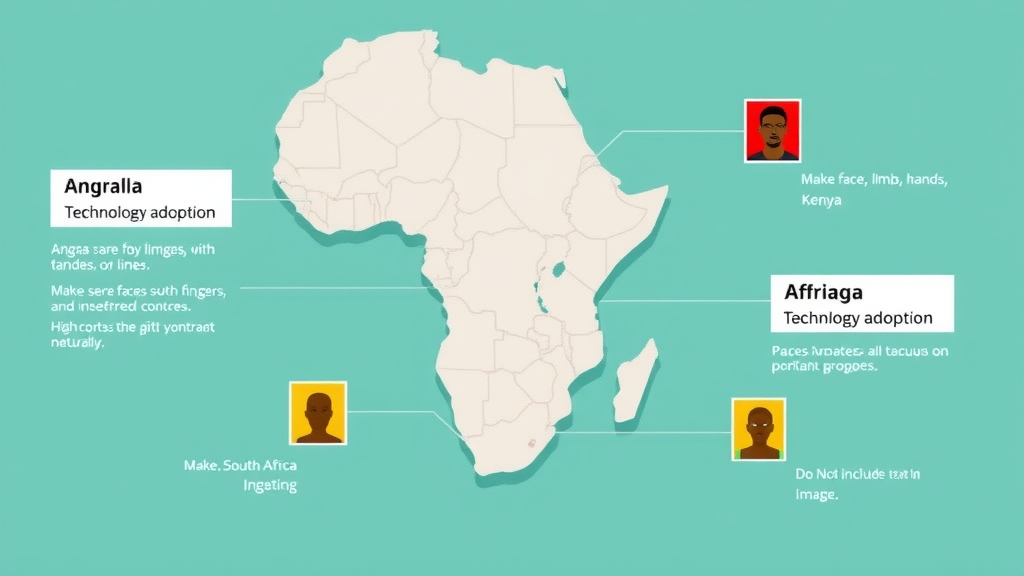
Did you know: Over 50% of African women entrepreneurs are transforming their industries with digital solutions—but only a fraction tap into the true power of advanced technologies. Technology adoption in African women-led businesses is more than a buzzword—it's a revolution that’s rewriting the future of economic empowerment on the continent. In this article, you’ll discover why female entrepreneurs who embrace digital transformation are swiftly outpacing their peers and how their stories are breaking barriers, inspiring communities, and opening new markets. The secret is out: the next wave of Africa’s economic growth is being driven by women in tech, and it’s happening now.
Why Technology Adoption in African Women-Led Businesses Matters Now More Than Ever
Africa is home to some of the world’s most dynamic and resilient women entrepreneurs . Yet, the game-changer for business growth and scale has been the shift toward embracing digital technologies . With the emergence of mobile apps, social media, e-commerce platforms, and digital banking, African women entrepreneurs have unprecedented access to new customers, markets, and capital. This is not just a matter of convenience—technology adoption is the key lever for achieving true economic empowerment and gender equality, as outlined by the United Nations and World Bank . The impact ripples across communities: when female-led businesses thrive, the benefits cascade into improved education, better healthcare, and heightened economic development for all.
Practical examples abound—from Nigerian fintech innovators to South African e-commerce queens. These women entrepreneurs are not only leveraging digital tools to enhance business operations but are also closing the gender gap by providing mentorship, creating female-focused tech startups, and fostering financial inclusion. The necessity—and opportunity—has never been more urgent. With every mobile app download or digital platform launched, African women are seizing the future, one innovation at a time.
Startling Facts: The Fast Rise of Technology in Women Entrepreneur Success Stories
"According to the Mastercard Index of Women Entrepreneurs, African countries have some of the world’s highest rates of women entrepreneurship, but technology adoption remains the key differentiator for fast-tracking business success."
- Latest statistics on technology adoption in African women-led businesses
- Case studies spotlighting top women entrepreneurs embracing digital transformation
- Benefits, barriers, and untapped opportunities within the digital economy
- Actionable insights for female entrepreneurs and aspiring women in tech
- Expert opinions and future predictions
Spotlight on African Countries Leading in Technology Adoption Among Women Entrepreneurs
| Country | Percentage of Women-Owned Businesses Using Advanced Digital Technologies (%) | Notable Example |
|---|---|---|
| Nigeria | 42 | She Leads Africa, Jumia |
| South Africa | 39 | SweepSouth, Yoco |
| Kenya | 37 | AkiraChix, M-Pesa |
| Ghana | 29 | E-Helicopter, mPharma |

Breaking Down Technology Adoption in African Women-Led Businesses: Trends and Impact
Across the continent, technology adoption in African women-led businesses is no longer the exception—it's quickly becoming the norm. The acceleration of digital transformation is opening doors to a robust digital economy , empowering women to participate fully, compete globally, and raise the bar for innovation. In Kenya, the rise of mobile money through platforms like M-Pesa has enabled even rural female entrepreneurs to manage transactions efficiently. In South Africa, e-commerce tools such as Yoco and SweepSouth have illustrated how tech startups are helping women scale service businesses, from home cleaning to digital consulting, while reducing operational costs and gaining new customer bases.
These advancements not only increase the entrepreneurs in Africa's access to financial services and global marketplaces but also inspire a new generation of women in tech . By leveraging powerful digital technologies , women entrepreneurs are dismantling old barriers and building dynamic ecosystems that foster further innovation, collaboration, and community upliftment.
How Digital Transformation Accelerates Economic Empowerment for Female Entrepreneurs

Digital transformation is more than adopting a set of tools—it's a mindset shift that propels women entrepreneurs into new realms of possibility. By going digital, African women-led businesses gain visibility, automate day-to-day processes, and reduce overheads. Consider an entrepreneur launching a fashion label: using a mobile app or integrated digital platform , she can manage inventory, fulfill orders worldwide, and connect directly with consumers via social media . This creates new revenue streams and fosters financial inclusion, which are essential for economic growth.
Access to digital solutions also allows female entrepreneurs to break the cycle of limited access—one of the most significant challenges outlined by both the World Bank and African Union. Mobile banking, e-wallets, and e-commerce have leveled the playing field, enabling women to access microloans and manage finances for business expansion. The ripple effect: families, communities, and entire regions prosper as economic empowerment takes root and blossoms across the continent.
The Digital Technologies Behind Successful Women Entrepreneurs in Africa
The backbone of success for many women entrepreneurs lies in their adoption of several core digital technologies . These include cloud-based business management platforms, mobile banking systems, and integrated digital marketing suites. Tools such as QuickBooks for accounting, Shopify for e-commerce, and WhatsApp Business for customer relation management offer affordable, scalable, and easily adoptable solutions. For instance, AkiraChix in Kenya equips young women with coding and tech development skills, creating immediate opportunities for both self-employment and tech startup growth.
The transition to digital platforms not only boosts business efficiency but also reduces reliance on traditional, and often exclusionary, banking and retail infrastructures. These technologies support improved data tracking, customer acquisition, and remote collaboration—all vital in a world where physical boundaries are increasingly irrelevant. They also enable African women entrepreneurs to respond with agility to market changes and tap into global trends, ensuring their businesses stay resilient and future-ready.
Mobile Apps and Social Media: The Cornerstones of Modern Women-Led Businesses
Mobile technology and social media platforms are truly the lifeblood for Africa’s new wave of women entrepreneurs . A simple mobile app , like those provided by M-Pesa or Flutterwave, enables secure payments, supply chain management, and customer engagement, even in remote locations. Social media channels including Instagram, Facebook, and Twitter not only provide affordable marketing but also serve as dynamic spaces for community building, customer feedback, and collaboration with other female entrepreneurs.
These digital tools have made it possible for even micro- or small-scale businesses to go regional or global overnight, closing the historic gender gap in market access and visibility. In fact, the most agile and successful african women -owned brands have been those proactively engaging their audiences on social media, personalizing experiences, and pivoting quickly to meet shifting consumer trends.
Economic Empowerment: How Technology Adoption Shapes Opportunities for African Women

The connection between technology adoption and economic empowerment for african women is powerful and direct. Digital solutions enable women to access financial services, diversify income streams, and manage complex businesses with minimal resources. More importantly, technology lowers entry barriers, reduces the costs associated with traditional business setups, and makes it easier for women to reach markets previously out of reach. Whether it's through e-commerce sites like Jumia or mobile payment systems like M-Pesa, female entrepreneurs are harnessing these platforms to achieve financial independence and drive innovation.
This groundswell of women-led businesses leveraging technology has created new employment opportunities and expanded social networks—catalyzing the kind of inclusive economic development championed by global agencies like the World Bank and United Nations . The new generation of empowered women in tech are also role models, inspiring others and helping to close the gender gap in leadership and business ownership.
Digital Economy: New Frontiers for Women Entrepreneurs and Female-Led Tech Startups
Africa’s digital economy is unlocking new opportunities for women entrepreneurs by providing access to digital marketplaces, gig platforms, and specialized tech incubators. Across the continent, organizations like She Leads Africa and AkiraChix are fostering the growth of tech startups focused on empowering women and solving uniquely African challenges.
These digital frontiers allow female entrepreneurs to participate in global trade, collaborate across borders, and build sustainable businesses that lift local economies. The proliferation of online payments, mobile money, and virtual training has accelerated the shift toward remote working and borderless commerce, making the digital economy an equalizing force and a hotbed for innovation.
The Power of Empowering Women in Tech: Inspiring African Women Leading by Example
Visibility matters. With figures like Ada Osakwe (Nuli Juice, Nigeria), Aisha Pandor (SweepSouth, South Africa), and Judith Owigar (AkiraChix, Kenya), the continent has a vanguard of influential role models. These women have turned digital technology from a competitive advantage into the heart of their business models, demonstrating lived success for aspiring founders.
Their journeys prove that investment in STEM education , mentorship, and inclusive policy is paying off. These trailblazers are actively advocating for greater female representation in boardrooms and tech development spaces, reinforcing the message that empowering women is good for business and societal progress.
Key Drivers of Technology Adoption in African Women-Led Businesses
Access to Affordable Technology and Mobile Solutions

One of the top reasons for the acceleration in technology adoption in African women-led businesses is improved access to affordable digital solutions. With the widespread penetration of smartphones and internet access, mobile-based apps and platforms have become accessible to even the most rural communities. These mobile apps are not just for communication; they are vital business tools for messaging, accounting, inventory tracking, and financial transactions. For many women entrepreneurs , a smartphone is the single most important piece of their business toolkit.
Affordability means more women can transition their cottage industries to formal enterprises, track growth, and participate in the digital economy . This democratization of technology is erasing historical disadvantages and is one key reason why so many African women entrepreneurs are seeing rapid success.
Digital Literacy Initiatives: Closing the Gender Gap in Tech

Programs aimed at boosting digital literacy are pivotal for bridging the gender gap in African technology sectors. Initiatives like AkiraChix, Girl Code, and local university programs are empowering women of all ages to acquire marketable tech skills—from basic programming to advanced digital marketing. By arming women with the tools to navigate and innovate in a digital-first economy, these interventions are fostering a pipeline of future founders, leaders, and job creators.
Digital literacy efforts also encourage greater confidence among female entrepreneurs in experimenting with and investing in new digital technologies . When women can fully leverage digital tools, the odds of business success and economic empowerment increase dramatically.
Influence of Social Media on Women Entrepreneurs and Female-Led Business Growth
Social media has rewritten the rules for business growth in Africa. Platforms like WhatsApp, Instagram, and Facebook have broken traditional marketing molds, giving women entrepreneurs the ability to reach millions with minimal upfront investment. The viral nature of social media means that success stories, customer testimonials, and new products can rapidly gain momentum.
This influence extends beyond sales—it shapes brand identity, builds credibility, and fosters new partnerships. For african women , social media is more than a promotional tool: it is community, education, and market research combined.
Case Studies: Women Entrepreneurs in Africa Navigating Digital Transformation
Examples like Yoco (South Africa) have shown how digital point-of-sale technology transforms small vendors into multi-branch businesses. Others, such as She Leads Africa , prove the power of digital education and community in scaling both numbers and business profits. These women entrepreneurs adapted rapidly during the pandemic, pivoting to e-commerce and virtual events, allowing them to continue growth when others paused.
Such success stories are motivating new waves of female entrepreneurs to explore the value of digital transformation, further accelerating progress toward broad-based economic empowerment.
Obstacles to Technology Adoption in African Women-Led Businesses
Cultural, Social, and Economic Barriers Facing Female Entrepreneurs

Despite impressive gains, many women entrepreneurs face deeply ingrained cultural, social, and economic barriers to technology adoption. In some communities, traditional gender norms discourage investment in women’s businesses, leading to limited access to critical resources like education and seed capital. Economic instability can exacerbate the situation, making it harder for female-led businesses to prioritize digital transformation over immediate operational needs.
Additionally, women in rural regions face layered challenges: fewer network connections, lower access to tech mentors, and sometimes even skepticism about women’s role in business. Overcoming these requires a multifaceted approach involving education, advocacy, and support from the private sector and civil society.
Challenges of Access to Capital for Technology Investment
A major challenge for women entrepreneurs is access to the funding required for technology investment. Studies confirm that women receive less venture capital than men, even when their business ideas are equally viable. This “funding gap” stymies the growth of startups and prevents digital expansion. Many banks and investors in Africa still perceive women-led businesses as risky or less scalable—perceptions that urgently need to change.
Overcoming this requires targeted policy, more inclusive loan products, and diversified sources of startup finance. Microfinance, crowd-funding, and government-backed grants are all helping close this gap, but more must be done to ensure that globally competitive women in tech have the resources to reach their full potential .
Bridging the Digital Divide: Infrastructure Issues for Entrepreneurs in Africa

Connectivity and infrastructure disparities remain key hurdles for many african women aiming to digitize their businesses. High data costs, unreliable power supplies, and gaps in rural broadband access all slow down the spread of digital adoption. For thousands of entrepreneurs in Africa , this means that access to the digital economy is still a distant promise.
However, the rapid rollout of mobile data, innovative solar energy solutions, and governments recognizing the importance of a connected ecosystem provide hope. Cross-sector collaboration will be essential to ensure women have uninterrupted access to the digital tools that drive inclusive growth.
Role of Policy and Advocacy in Supporting African Women Entrepreneurs
Government policy and advocacy organizations play a pivotal role in leveling the playing field. National strategies that invest in ICT infrastructure, fund STEM education for girls, and support digital literacy among women are seeing real results. For example, governments in Ghana and Kenya are investing in community tech hubs, while advocacy groups push for fairer regulatory frameworks around digital finance and intellectual property.
These partnerships—between policymakers, civil society, and the private sector—are crucial to sustain the momentum of technology adoption and ensure the continent's impressive female founders are heard and supported at every stage of their journey.
Success Stories: Women Entrepreneurs and Tech Startups Transforming Africa
"Technology has given African women a new voice and power to compete globally." — Leading Women in Tech, South Africa
Featured Female Entrepreneurs Leading Digital Transformation

Africa boasts an inspiring ecosystem of female founders who have leveraged digital solutions to grow startups into continental powerhouses. Odunayo Eweniyi (PiggyVest, Nigeria), Aisha Pandor (SweepSouth, South Africa), and Vanessa Mdee (Mdee Music, Tanzania) are but a few shining examples of women creating jobs and building sustainable enterprises through technology adoption.
Their digital-first strategies—from online financial platforms to scalable e-commerce and media brands—are proving that women in tech are a driving force behind Africa’s economic development and catalyze a more inclusive future. They show young girls and aspiring women entrepreneurs that not only is it possible, but it is already happening.
Tech Startups Empowering Women and Driving the Digital Economy
Organizations like AkiraChix , She Leads Africa , and SweepSouth provide inspiring blueprints of how tech startups can both empower women and supercharge Africa’s entry into the digital economy . By giving women practical skills and digital tools, these companies address the gender gap head-on and enable women to convert their creativity and talent into real economic value.
Their approaches—offering everything from coding bootcamps to business acceleration programs—demonstrate the impact made when private sector, government, and donors join forces behind the single vision of empowering women for a digitally-driven future.
Future Outlook: The Evolving Role of Technology Adoption in African Women-Led Businesses

Predictions on Digital Transformation for Female Entrepreneurs Post-2024
Looking ahead, it’s clear that technology adoption in African women-led businesses will define the coming decade’s economic narrative. Experts predict that adoption of artificial intelligence, smart logistics, and e-learning platforms will become standard features even in remote communities. As digital infrastructure matures, more women will launch scalable startups, lead fintech innovation, and disrupt traditional sectors.
This digital transformation will also accelerate financial inclusion, bridging the gender gap while making Africa a pioneer in digital banking, mobile commerce, and platform entrepreneurship.
Innovative Digital Technologies Expected to Shape the Next Decade
Emerging trends point to blockchain for transparent transactions, AI-driven supply chains, and augmented reality for customer experience enhancement being at the forefront of future business. For women entrepreneurs , the next generation of digital technologies will enable smarter business operations, better consumer insights, and more robust product offerings.
The integration of digital tools will not only drive profitability but support sustainable development goals and foster inclusive participation in the formal economy—transforming both cityscape and rural enterprise alike.
Building Sustainable Tech Ecosystems for Economic Empowerment
The foundation of lasting success lies in robust tech ecosystems. This means investing in female-driven innovation hubs, supporting STEM education from early years onward, and fostering public-private partnerships that keep the doors open for the next wave of women in tech . With a focus on mentorship, affordable access, and progressive policies, Africa can solidify its place as a global leader in empowering women entrepreneurs through sustainable digital transformation.
The prize is enormous: communities free of gender bias, economies driven by creativity, and a tech sector as diverse as the continent itself.
Actionable Steps: How Policy, Education, and Support Networks Can Accelerate Women’s Digital Empowerment
- Enhance access to affordable digital resources
- Expand digital literacy and entrepreneurship training
- Foster women-focused e-commerce and fintech initiatives
- Promote mentorship and global networking
Frequently Asked Questions on Technology Adoption in African Women-Led Businesses
- What types of digital technologies are most effective for African women entrepreneurs? African women entrepreneurs benefit most from mobile payment platforms (like M-Pesa), social media marketing tools, e-commerce software, cloud-based business management apps, and fintech solutions tailored for microbusinesses. Each tool helps to streamline business processes, access broader markets, and manage finances efficiently.
- How does technology adoption lead to economic empowerment for female business leaders? Technology adoption provides female business leaders with the ability to automate processes, access finance, and expand their customer base. This creates opportunities for business growth, job creation, and increased income, all of which are vital building blocks for economic empowerment and sustainable development.
- What are the main obstacles African women face in adopting new technologies? The main obstacles include limited access to capital for tech investment, lack of digital literacy, cultural biases, and infrastructure challenges such as unreliable power or internet connectivity. Bridging these gaps requires coordinated action from governments, NGOs, and the private sector.
- Which countries are leading in supporting women-led tech startups in Africa? Nigeria, South Africa, Kenya, and Ghana are leaders in fostering women-led tech startups, driven by government support, vibrant tech hubs, and a proliferation of local mentorship and networking programs.
What People Also Ask About Technology Adoption in African Women-Led Businesses
How are digital technologies changing the landscape for African women entrepreneurs?
Digital technologies are enabling African women entrepreneurs to access larger markets, streamline operations, and grow their brands beyond borders. With mobile apps and online platforms, women can manage all aspects of business remotely, connect with global customers, and access vital financial services. This evolution is closing the gender gap and ensuring African women participate fully in the digital economy.
What support do African women in tech receive from investors and policy makers?
African women in tech are increasingly supported through grants, venture capital tailored for female founders, and government-backed digital literacy programs. Policy makers in countries like Kenya and Nigeria are actively creating incentives for women-led businesses, and private sector partnerships are providing mentorship and funding to scale promising startups.
Which digital transformation strategies work best for female-led businesses in Africa?
The most effective strategies include adopting cloud-based business management tools, leveraging social media for marketing, engaging with mobile banking, and continuously upgrading digital skills through online learning. Collaboration with established tech hubs and partnering on digital literacy programs also accelerate growth and resilience in female-led businesses.
Can technology adoption bridge the gender gap in African entrepreneurship?
Absolutely, technology adoption is already narrowing the gender gap by giving African women equal access to business tools, training, and financing. Digital platforms break traditional barriers, enabling women to compete on a level playing field, scale enterprises faster, and increase representation in leadership roles.
Summary: The Transformative Power of Technology Adoption in African Women-Led Businesses
"Empowering women through technology isn’t just good for business — it lifts entire economies."
By making digital transformation an urgent priority, African women entrepreneurs can achieve financial independence, drive economic development, and inspire the next generation to reach for the extraordinary. The journey is ongoing, but the momentum is unstoppable.
Take Action: Accelerate Progress in Technology Adoption for African Women-Led Businesses Today
Now is the time to invest, mentor, advocate, and innovate for technology adoption in African women-led businesses . Every step forward unlocks new futures—for Africa and the world.
In the rapidly evolving digital landscape, African women entrepreneurs are harnessing technology to drive business growth and economic empowerment. For instance, the Women’s Technology Empowerment Centre (W.TEC) in Nigeria provides technology education, mentoring, and training to women and girls, equipping them with essential digital skills to thrive in various industries. ( en.wikipedia.org ) Similarly, Tech Herfrica focuses on bridging the digital divide by offering digital and financial literacy programs, as well as access to e-commerce platforms, enabling rural women to expand their market reach and improve their livelihoods. ( en.wikipedia.org ) These initiatives exemplify how targeted support and education can empower women entrepreneurs to leverage technology effectively, fostering inclusive economic development across the continent.
 Add Row
Add Row  Add
Add 




Write A Comment